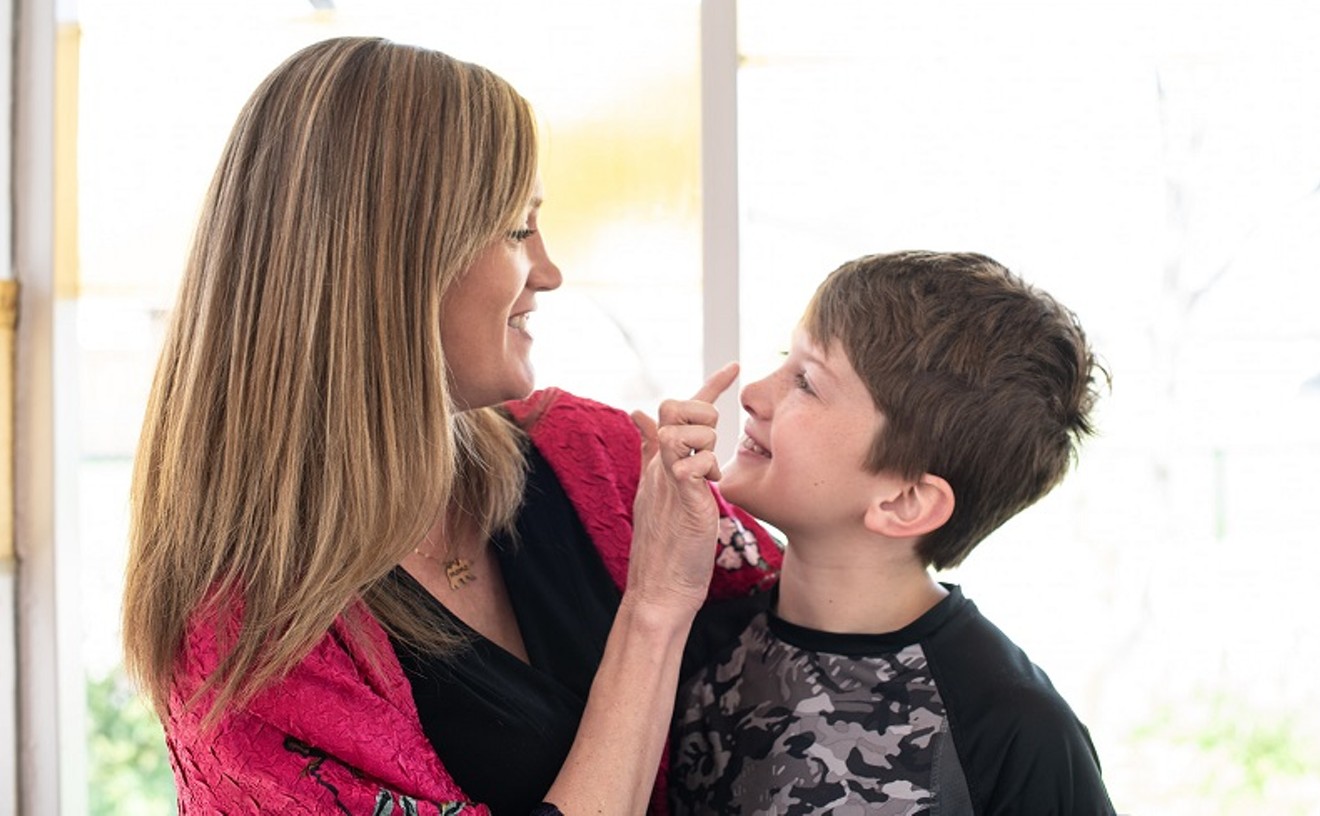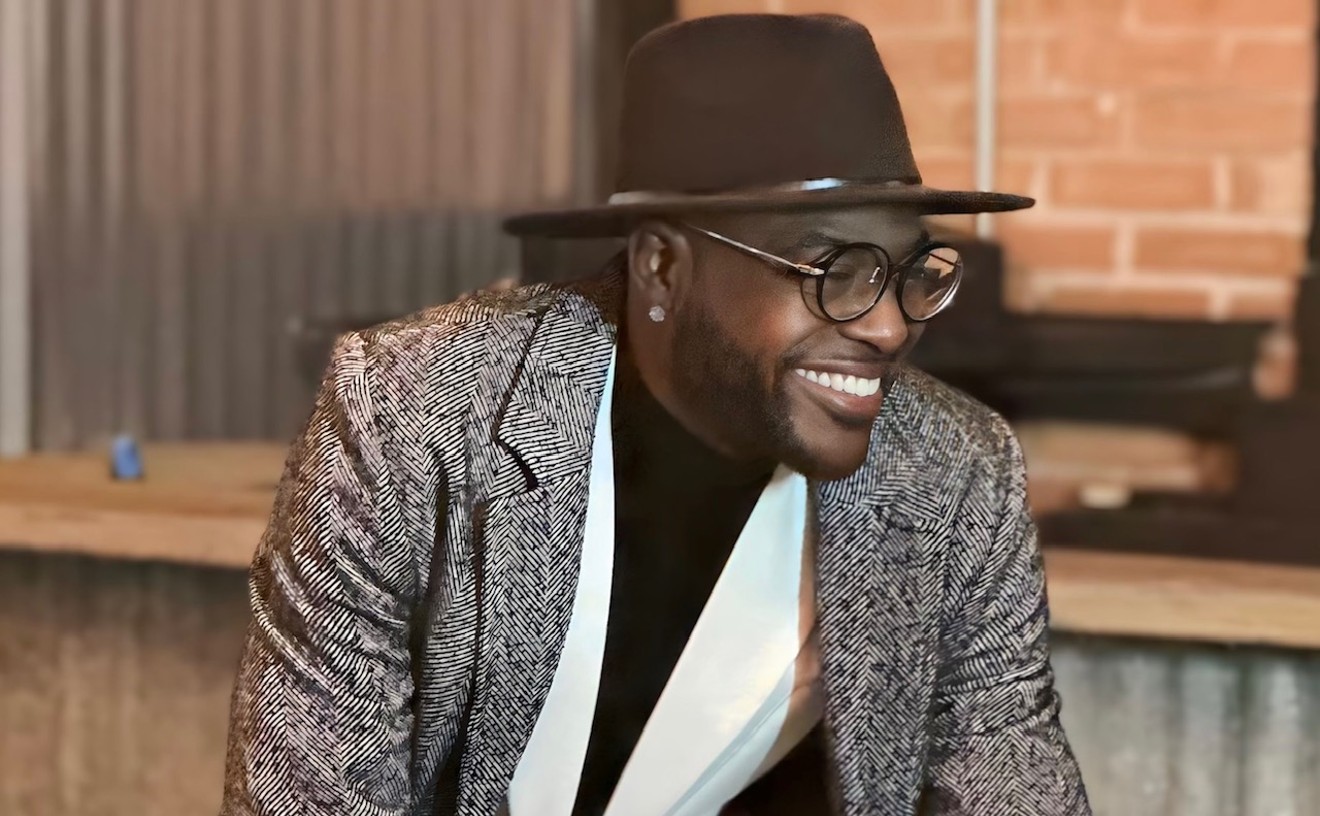When we first see Helen, played by the pretty and plus-sized Christina Vela, she's eating alone. Standing at an office building lunch counter, Helen works her way through a plate of pizza and salad with gustatory gusto. When she forks up a big bite of the greens, she makes a face. Not enough dressing. She rips open the packet, squeezes the creamy stuff into the bowl and then slurps the remaining drops directly into her mouth. Licks her fingers too.
Along comes Tom, played by sleek and handsome Ian Leson. He's carrying a tray (small salad, no dressing, bottle of water) and having trouble finding an empty spot to set it down. He passes Helen several times before reluctantly settling in next to her. His first words: "Pretty big."
He's talking about the cafeteria. She thinks he means her.
They start with small talk, but there's an instant, easy rapport between Helen and Tom. She's a librarian who likes old war movies. He's a nice guy who shuffles papers in a cubicle job. She flirts madly, occasionally wincing at her own audaciousness. He's intrigued by her openness, her wit.
But she can't help doing the fat girl thing of making fun of herself. She cracks a joke about how they're going to start dating. He looks startled. She gets self-conscious.
Helen: Anyway, I was just playing. Big people are jolly, remember?
Tom: Ummm, hmmm...
Helen: One of our best qualities.
Tom: Well, at least you've got one.
Helen: And you don't?
Tom: Ahhh...open for debate.
Helen: Really?
Tom: I mean...you know, if I really had to come up with one, for, say, the big guy upstairs or whatever, I'd probably do something like "does not run with scissors" or one of those "plays well with others."
Helen: Really? Handsome guy like you and that's all you're good for...to look at?
Tom: Pretty much.
Helen: Good to know.
And then she offers him one of her two pudding cups.
It's not evident to Helen or to us at this point that Tom's precisely as shallow as he's just described. Through LaBute's writing--his tightest and most relatable work since his dark drama Bash--we are swept into the romance of Helen and Tom, hoping they'll overcome all obstacles. But this being LaBute, a happy ending is out of the question. He is, after all, the writer of the films In the Company of Men and Your Friends and Neighbors--movies about men who hate women and the women they humiliate. He also wrote The Shape of Things, about a pretty woman who debases a homely guy, just in case you're keeping score.
Directed by Jonathan Taylor, Kitchen Dog's production of Fat Pig is fearless and flawless. From the casting of Vela and Leson, actors capable of creating real heat between their alter egos, to the set design, also by Taylor, of giant modular Roy Lichtenstein-inspired comic book panels that reflect the storyline, it all works together seamlessly.
LaBute isn't the easiest playwright to act. His dialogue can be quirky and colloquial, full of odd semantic lurches, injections of "whatever" and sentences that don't end but rather trail off into the whisper of ellipses. At this, Vela and Leson are experts, speaking the lines and doing the acting without obvious effort, in a style so natural the audience feels like eavesdroppers.
Because they're so real to us, we emotionally invest in the outcome of Helen and Tom. They seem right together. We want it to work, especially after their romping love scene in which it's clear that Tom likes an abundance of curves. Then Tom begins listening to the careless chatter of his coworkers, a misogynistic weasel named Carter, played with detestable ooze by Lee Trull, and the petite and frighteningly insecure Jeannie (Leah Spillman, always believable playing tightly wound, unlikable women). Tom used to date Jeannie, who can't understand why he'd prefer someone Helen's size.
And there you have it, the crux of this tale. The tyranny of body types trumps all other differences in romance. Races, religions, rich and poor, smart and stupid--love conquers all of those, on the stage anyway. Roxane loved Cyrano despite his big nose. But would even he have loved her back if she'd had a big behind?
Vieux Carr is latter Tennessee Williams, containing shades of Streetcar, The Glass Menagerie and his other greats. It is a shapeless but elegiac work, about lost souls dancing with death in a spooky rooming house in 1940s New Orleans, the time when Williams had just moved there to find his way as a writer.
Now onstage in a good production at Theatre Three, Vieux Carré is the work of an old playwright trying to recapture the voice and the memory of his younger self. In this play are characters we know better from earlier works. Tye, a shiftless carnival barker with a taste for broads and booze, bears a strong resemblance to Stanley Kowalski (and is played by Shelby Davenport like a B-version of him, string T-shirt and all). His girlfriend Jane (Kelly Rypkema), dying of leukemia and drifting away, might be a younger Blanche DuBois. The narrator (Beau Trujillo), a young gay writer sharing the attic of 722 Toulouse Street with an older consumptive artist (Bob Hess), is Tennessee himself.
The fearsome banshee in this bunch is the wicked Mrs. Wire, played by Cindy Beall with the bugged eyes and scratchy rasp of the elderly Bette Davis. Mrs. Wire, the landlady, keeps tabs on her boarders from her cot in the front hallway. She never seems to sleep, haunting the rooms and unsettling the residents with terrifying behavior. Discovering that her basement tenant is holding same-sex parties, she pours scalding water through the floorboards. In her mad scene in the second act, she imagines the young writer to be her long-lost son, and like Violet Venable (of Williams' Suddenly Last Summer) times 10, she reveals incestuous yearnings for the boy.
This spooky visit to the Vieux Carré (pronounced VOOK-array) is all character study and no tenable plot. But it's Tennessee Williams through and through. Death and madness are the unseen stars of the 1978 drama, stalking the old house and its inhabitants.
"Pride's an easy thing to go past...sometimes," says Mrs. Wire. She also says "loneliness is an affliction," a line so Williams-esque, it begs to be uttered with a Southern drawl.
Jeffrey Schmidt directs a strong cast, benefiting from the electrifying presence of Shelby Davenport, a newcomer to the Dallas stage, having taught theater at St. Edward's University. Bob Hess, one of the area's most dependable comedic actors, shows new colors as the dying artist, pining for one night of passion with the handsome writer sharing his garret. Cindy Beall is riveting as the old lady, screwing her face into a knot and bellowing low notes like a tuba.
The only element of this production that rings false is Schmidt's scenic design. Theatre Three's in-the-square set-up always limits design choices, but in this case, one corner of the small acting space is eaten up by a cartoonish depiction of the rooming house's façade. The placement of it renders too much of the stage area dead and unusable. At the end, the house awkwardly collapses, an unnecessary special effect that imposes comment on the work of a playwright whose words speak for themselves.










